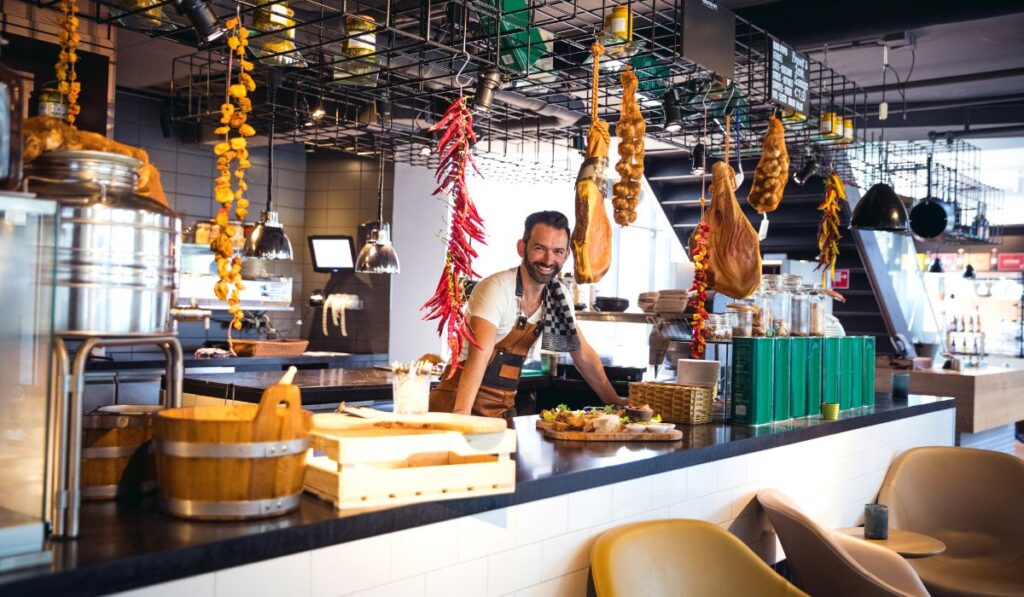In today’s digital age, having a strong online presence for your restaurant is no longer optional; it’s essential. Customers need to find you quickly and easily across multiple platforms, and one powerful way to achieve that is through restaurant SEO (Search Engine Optimization). With the rise of online ordering and food delivery disrupting the traditional restaurant model, restaurant owners must invest time in optimising their online presence to ensure their establishment appears on search engines like Google. In this article, we’ll explore the world of local SEO and its benefits and provide seven effective tips to Boost Your Local SEO for Restaurants.
SEO in Modern World
SEO, an abbreviation for search engine optimisation, refers to the process of optimising a website to appear in search results on search engines such as Google and Yahoo. It involves strategically optimising various elements of your website to improve its visibility and attract more traffic. By targeting specific keywords related to your core business, you increase the chances of appearing on the first page of search engine results, ultimately driving more potential customers to your site and, subsequently, your restaurant.
The Benefits of Local SEO for Restaurants
Implementing SEO practices for your restaurant can yield numerous benefits that contribute to your overall success. Let’s explore some of these benefits:
- Increasing Website Traffic: By optimising your website for relevant keywords, you can attract more visitors and potential customers to your site. Increased traffic often translates into higher revenue and greater opportunities for customer engagement.
- Boosting Online Orders and Reservations: With online ordering growing at a rapid pace, implementing SEO techniques can help drive more online orders and reservations for your restaurant. Appearing in search results when potential customers are looking for dining options greatly increases the chances of them choosing your establishment.
- Building Brand Awareness: SEO helps in creating brand visibility and recognition. When your restaurant appears on the first page of search results, users become familiar with your brand, leading to increased brand awareness and a higher chance of being selected over competitors.
- Enhancing Customer Engagement: A well-optimized website provides a seamless user experience, making it easier for customers to navigate your site, access information, and interact with your brand. You can build lasting relationships and encourage repeat visits by engaging customers effectively.
- Driving Revenue Growth: Ultimately, implementing SEO practices helps your restaurant generate more revenue. You create a solid foundation for growth and success with increased website traffic, online orders, reservations, and customer engagement.
7 Restaurant SEO Tips to Help Your Website Rank #1
Now that we understand the importance of SEO for restaurants let’s dive into seven effective tips to optimise your online presence and boost your search engine rankings:
Create a Keyword Planning Roadmap
To start, build a comprehensive keyword planning roadmap for your restaurant. Identify key search terms and phrases relevant to your business and locality. This includes general restaurant terms, niche keywords specific to your offerings, and branded keywords. Utilise keyword planning tools such as Google Keyword Planner, Dragon Metrics, or SEMrush to refine your list and prioritise keywords based on search volume and relevance.
Optimise for Local SEO
Optimising local SEO is crucial for restaurants targeting customers in specific geographical locations. Ensure your restaurant is listed accurately and consistently on local directories, review sites, and social media platforms. Platforms such as Google My Business, Yelp, Foursquare, TripAdvisor, and Yellowpages allow you to provide consistent information and enhance your visibility in local search results.
Optimise Your Website for Mobile Devices
In today’s mobile-dominated world, having a mobile-friendly website is vital. Mobile optimisation enhances the user experience and plays a significant role in SEO. Ensure that your website is responsive, loads quickly on mobile devices, and provides a seamless browsing experience. Mobile optimisation is a crucial factor that search engines consider when ranking sites, so prioritise this aspect to improve your search visibility.
Create High-Quality, Optimized Content
Content is king when it comes to SEO. Develop high-quality, engaging content that is optimised with relevant keywords. Incorporate those keywords naturally within your website’s pages, including the homepage, menu, blog posts, and other applicable sections. Focus on creating informative, unique, and valuable content for your target audience. Regularly update your blog with fresh, SEO-optimized content to improve your website’s visibility and attract organic traffic.
Encourage Online Reviews and Testimonials
Online reviews and testimonials are crucial for building credibility and impacting your search rankings. Positive reviews signal to search engines that your restaurant is trusted and reliable. Encourage satisfied customers to leave reviews on platforms like Google My Business, Yelp, and TripAdvisor. Respond to positive and negative reviews in a professional and timely manner to demonstrate your commitment to customer satisfaction.
Leverage Social Media Platforms
Social media platforms are powerful tools for promoting your restaurant and improving SEO. Create and maintain an active presence on popular platforms such as Facebook, Instagram, Twitter, and LinkedIn. Regularly share engaging content, including food photos, updates, promotions, and special events. Utilise relevant keywords, hashtags, and geotags to optimise your social media posts for search engines. Encourage user-generated content and engage with your followers to boost brand visibility and increase social signals that impact SEO.
Monitor and Analyze Performance
Regularly monitor and analyse your SEO efforts’ performance to identify improvement areas. Utilise tools like Google Analytics and Google Search Console to track website traffic, user behaviour, keyword rankings, and other important metrics. Analyse the data to understand what strategies are working and make data-driven decisions to optimise your SEO further. Stay updated with the latest SEO trends and algorithm changes to adapt your strategies accordingly.
Optimise Your Google My Business Profile
Google My Business (GMB) is a powerful tool for local SEO. Claim and optimise your GMB profile to ensure accurate information about your restaurant is displayed in search results. Provide up-to-date details such as your address, phone number, website URL, opening hours, and menu. Encourage customers to leave reviews on your GMB profile, as positive ratings and feedback can improve your visibility in local search results.
Implement Schema Markup
Schema markup is a form of structured data that provides additional information to search engines about your restaurant. By implementing schema markup on your website, you can enhance your chances of appearing in rich snippets, which are more visually appealing and informative in search results. Include relevant schema markup for your restaurant’s name, address, phone number, reviews, and menu items to improve your visibility and attract more clicks.
Focus on Local Keywords
Incorporate local keywords throughout your website’s content to target your local audience effectively. Include the name of your city or neighbourhood, along with relevant terms like “restaurant,” “dining,” or “cuisine.” For example, if your restaurant specialises in Italian cuisine in San Francisco, target keywords such as “Italian restaurant in San Francisco” or “best Italian cuisine in San Francisco.” This approach helps your restaurant rank higher in local searches and attracts customers specifically looking for dining options in your area.
Build High-Quality Backlinks
Backlinks from reputable and relevant websites can significantly improve your SEO. Seek opportunities to build high-quality backlinks by reaching out to local food bloggers, influencers, and industry publications. Offer to collaborate on content, guest blog, or provide them with exclusive offers or experiences. Backlinks from authoritative sources drive traffic to your website and indicate to search engines that your restaurant is trusted and relevant.
Optimise Website Speed and Performance
Website speed and performance are crucial factors for both user experience and SEO. A slow-loading website can deter visitors and negatively impact your search rankings. Optimise your website by compressing images, minifying code, leveraging browser caching, and using a content delivery network (CDN). Regularly monitor your website’s performance and make necessary adjustments to ensure it loads quickly and provides a seamless browsing experience.
Leverage Online Directories and Review Platforms
Apart from Google My Business, consider listing your restaurant on other online directories and review platforms specific to your region. Yelp, TripAdvisor, OpenTable, and Zomato are popular platforms that attract a large number of users searching for restaurants. Ensure your information is accurate and consistent across these platforms, and actively engage with customer reviews and inquiries.
Utilise Local SEO Landing Pages
If your restaurant has multiple locations or operates in different areas, consider creating dedicated landing pages for each location. Optimise these pages with location-specific keywords and information to attract local customers. This strategy helps target a wider audience and increases your chances of appearing in location-based searches.
Investing time and effort in SEO will pay off by helping your restaurant thrive in the digital era and secure long-term success in the highly competitive food industry.
Implement a Mobile-Friendly Website
With the increasing use of mobile devices, it’s crucial to have a website that is optimised for mobile browsing. A mobile-friendly website improves user experience and plays a significant role in SEO. Ensure that your website is responsive, loads quickly on mobile devices, and has easy-to-navigate menus and buttons. This will help you rank higher in mobile search results and attract customers who are searching for restaurants on their phones or tablets.
Create Engaging and Shareable Content
Content marketing is a powerful SEO strategy that can drive organic traffic to your website. Develop engaging and relevant content such as blog posts, articles, and videos that provide value to your audience. Share tips, recipes, behind-the-scenes stories, and other content that showcases your expertise and unique offerings. Encourage social sharing by adding social media buttons to your content, increasing visibility and attracting more visitors to your website.
Utilise Social Media Platforms
Social media platforms can complement your SEO efforts by increasing brand visibility and driving traffic to your website. Create and maintain active profiles on popular platforms like Facebook, Instagram, Twitter, and LinkedIn. Share enticing food photos and updates about special offers, events, and promotions, and engage with your followers. Social media interactions and engagement can indirectly impact your search rankings and help expand your online reach.
Monitor and Analyse Your SEO Performance
Regularly monitor and analyse your restaurant’s SEO performance to identify areas for improvement. Utilise tools like Google Analytics and Google Search Console to track website traffic, user behaviour, keyword rankings, and other relevant metrics. Analysing this data will help you understand what’s working well and where adjustments are needed. Make data-driven decisions to optimise your SEO strategy and stay ahead of your competition.
Stay Up to Date with SEO Trends
The SEO landscape constantly evolves, with search engines updating algorithms and introducing new ranking factors. Stay up to date with the latest SEO trends, algorithm changes, and industry best practices. Follow reputable SEO blogs, attend industry conferences, and network with other professionals to gain insights and stay ahead of the curve. By keeping your finger on the pulse of SEO, you can adapt your strategies and maintain a competitive edge.
Monitor and Respond to Online Reviews
Online reviews have a significant impact on a restaurant’s reputation and visibility. Encourage customers to leave reviews on platforms like Google, Yelp, and TripAdvisor. Monitor and respond to these reviews promptly, whether they are positive or negative. Engaging with customer feedback demonstrates your commitment to customer satisfaction and can positively influence your online reputation. It also signals to search engines that your restaurant is actively engaged with its customers, potentially boosting your search rankings.
Conclusion
By implementing these additional SEO tips, you can further strengthen your restaurant’s online presence, attract more customers, and increase your visibility in search engine results. Remember that SEO is an ongoing process, so regularly evaluate and refine your strategies to ensure long-term success.
Boost your online presence with VenCube! We’re a leading digital marketing agency specialising in driving targeted traffic, increasing brand visibility, and maximising conversions. Take your business to new heights today. Contact us and unlock your digital potential with VenCube!



